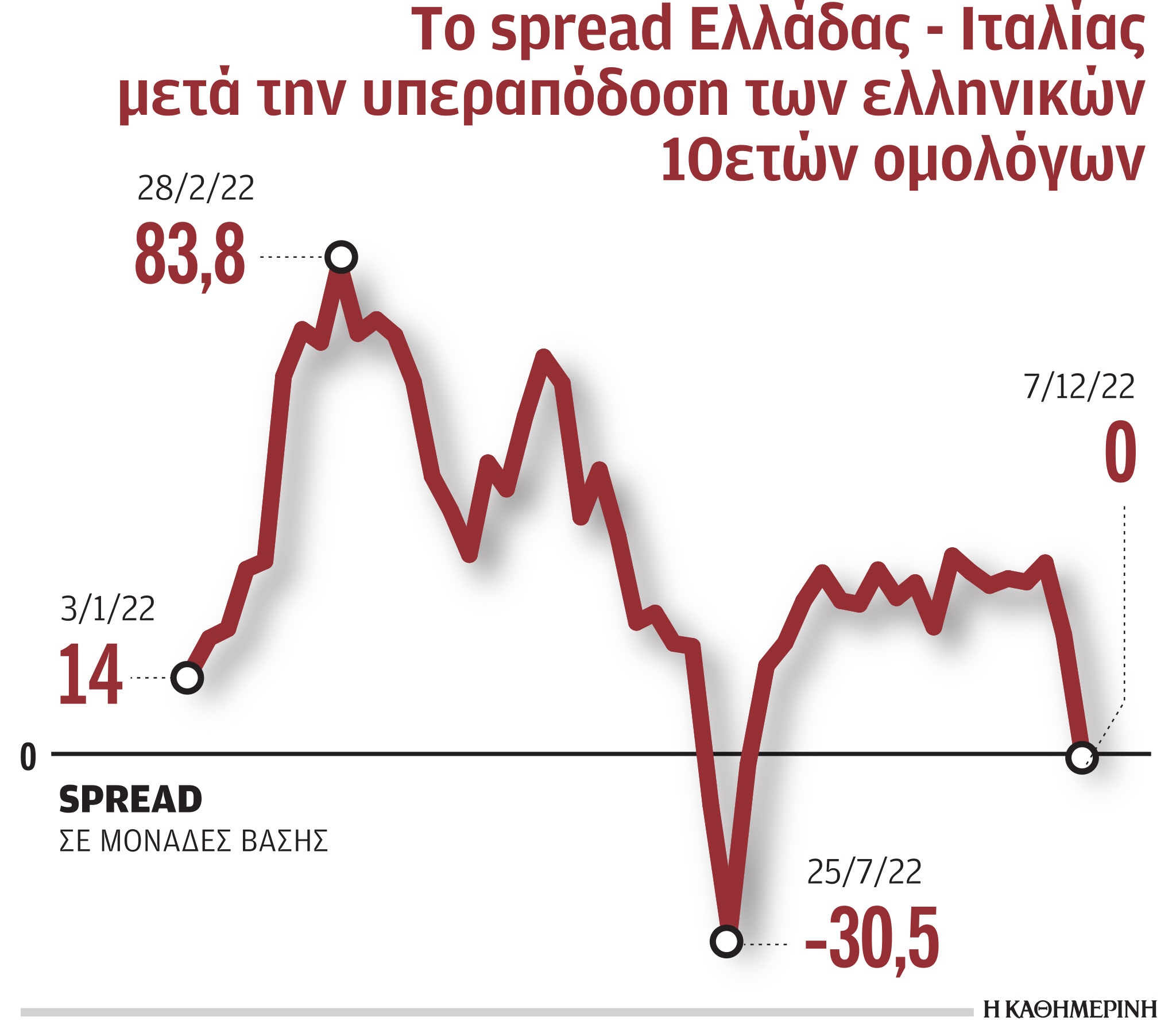
Greek 10-year bonds “called” the Italians again, after the last interval rally, more intense for Greek government bonds, at a time when they received support from ECB, in contrast to Italian bonds, where the central bank further cut its positions. However, thoughts about leaving the markets in December are not on his “table”. Public Debt Management Agencywhich is now focused on planning the new year.
By 3.65%
The spread between Greece and Italy closed to zero yesterday, with both countries yielding 3.65% on 10-year bonds as concerns over the outlook for the eurozone economy led investors to invest in the bond market rather than equities in anticipation of the ECB meeting.
At its peak this year, the spread reached 84 basis points at the end of February, before hitting a low in July last year, turning negative for the first time since August 2021, amid fears over Italy’s political landscape with Draghi’s resignation and early elections being called. . Over the summer, political risk pushed spreads in Italy to a dangerous level of 250 basis points, close to the highest level since Italy’s political crisis in 2018. However, the new Italian government, at least so far, has not caused “an uproar”. what the market feared and instead took a soft stance on the fiscal side, realizing the importance of the Recovery Fund funds to their economy and to the markets.
It is worth noting that the 5-year Greece-Italy spread has been moving at negative levels since November.
Greece’s spread against Germany is currently at 185 basis points and is the lowest level for 2022 after a particularly impressive rise in Greek bond prices since around mid-October. From 5.1%, at which the Greek 10-year bond yield was set about two months ago, it fell to 28% and the spread from a high of 270 basis points in October (which was also a two and a half year high). ) is now down 31%. And that’s because the improvement in Greek securities was the biggest in the Eurozone during this period, with the rally stronger in Greek assets.
In the past two months, the ECB has reduced its positions in regional bonds, with the exception of Greek bonds.
Reasons for overproduction
One of the reasons for this superiority – besides the resilience demonstrated by the Greek economy and the favorable profile of Greek debt with a declining debt-to-GDP ratio – is the support of the ECB, which in the last two months, although it did not realize the flexibility of PEPP reinvestment and continued to reduce its positions in the bonds of the region, made an exception for Greek bonds, increasing its exposure.
In particular, over the past two months, the ECB has increased its positions in Greek bonds by 729 million euros, while at the same time it has also increased its positions in German and Dutch bonds. On the contrary, between October and November, he reduced his positions in Spanish bonds by 1.4 billion euros, in Italian bonds by 794 million euros and in Portuguese bonds by 1.1 billion euros.
Another explanation for the dynamics of Greek bonds is the small size of the Greek market, which is an advantage in times of increased investor interest in bonds. This of course works in times of turmoil as it makes it more vulnerable to sell-offs at a time when it is the only non-investment grade in the Eurozone.
Analysts, however, are divided on the future of Greek bonds and also against Italian bonds. Société Générale has recommended positive (long) positions in Greek bonds for 2023, mostly post-election, against Italian bonds, stressing that strong Greek fundamentals and improved market liquidity will continue to support Greek securities. Its economists even predict that by 2026 Greece will have the highest budget surplus among the major eurozone countries, and by 2027 its debt-to-GDP ratio will equal that of Italy.
In contrast, Citigroup has announced negative rates on Greek bonds in 2023, mainly due to the uncertainty surrounding the electoral process, which could slow down the progress of reforms, jeopardizing the upgrade of Greece’s rating to investment grade. It is expected that this, in his estimation, will play into the hands of Italian bonds, which no longer involve political risk, at least according to the new government’s course.
Source: Kathimerini
Lori Barajas is an accomplished journalist, known for her insightful and thought-provoking writing on economy. She currently works as a writer at 247 news reel. With a passion for understanding the economy, Lori’s writing delves deep into the financial issues that matter most, providing readers with a unique perspective on current events.